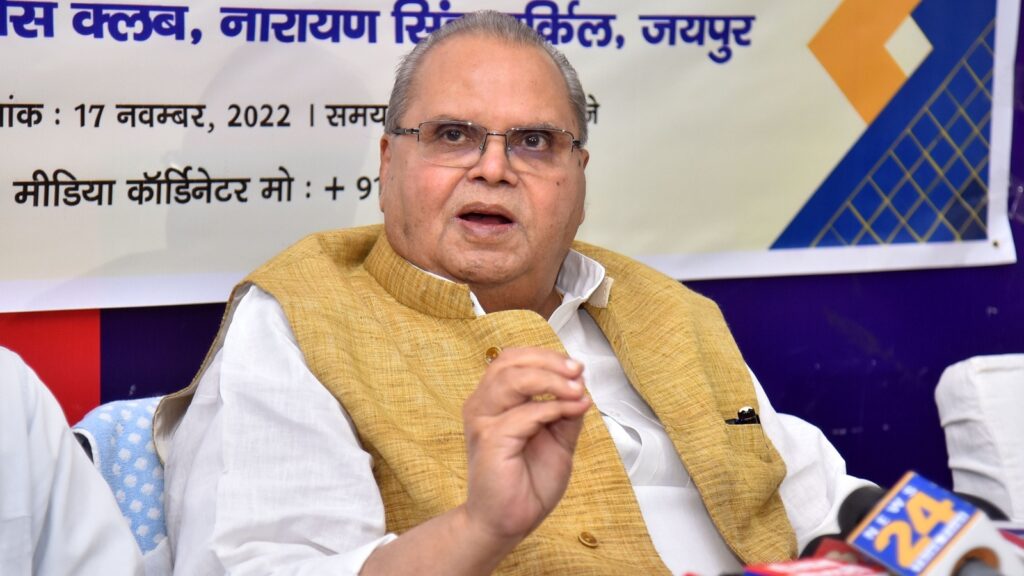SrinagarAug 6, 2025 13:51 IST
First published on: Aug 6, 2025 at 13:51 IST
When Satya Pal Malik was appointed the Jammu and Kashmir Governor in August 2018, he was the first politician to hold the post in the erstwhile state in over five decades. From 1967 till Malik’s appointment, the Centre-appointed Governors were either bureaucrats or armed forces and intelligence officers. Malik passed away in Delhi on Tuesday at the age of 79.
Malik’s appointment as Governor — he succeeded the suave but astute bureaucrat N N Vohra — was seen in the Valley as the Centre’s “realisation” that J&K is a “political problem” that needs a “political solution”. But his 14-month tenure as Governor turned out to be among the most controversial periods for J&K.
On August 3, 2019 – two days before the Centre abrogated Article 370 and split J&K into two Union Territories – Malik asked the public to remain calm and reject “exaggerated and unfounded rumours”. But just two days later, he oversaw the sweeping Constitutional changes in J&K as the Centre abrogated its special status. Political leaders, including three former Chief Ministers, were jailed, a strict curfew was imposed, and Kashmir was disconnected from the outside world for six months as internet and telephone services were halted.
Though Kashmir has a long history of grievances with the Centre-appointed Governors, Malik was seen as an enabler who played a crucial part in “disempowering” the people of J&K.
Just three months into the office, Malik was at the centre of a controversy that was popularly known as “faxgate” in J&K. In November 2018 – four months after the BJP walked out of a coalition government with Peoples Democratic Party (PDP) – when the PDP, National Conference (NC) and Congress together staked a claim to form a new government in J&K, Malik hastily announced the dissolution of the Assembly. His contention: The three political parties – two of whom, the PDP and NC, were rivals – would be unable to form a stable government despite the numbers being in their favour.
In a post on X at the time, PDP chief Mehbooba Mufti shared a letter in which she had staked a claim to form the government and said the Governor was not accessible, prompting the NC’s Omar Abdullah to say, “The J&K Raj Bhawan needs a new fax machine urgently.” At the same time, People’s Conference chief Sajad Lone also staked a claim to form the government via WhatsApp. But Malik said there was no one at his office to receive the relevant faxes because of a holiday.
The statements of an outspoken Malik often pitted him not only against political leaders in the Valley, but also against Prime Minister Narendra Modi. On February 14, 2019, a Jaish-e-Mohammed suicide bomber killed 40 CRPF personnel in Pulwama – bringing India to the brink of a war with Pakistan. Later, in an interview, Malik accepted the attack stemmed from an intelligence failure and alleged that the PM had told him not to speak about the “Home Ministry’s lapses”. Malik even said the Prime Minister is “ill-informed” and “ignorant” about Kashmir.
Malik often accused the Valley’s political leaders of corruption, though he didn’t spare even BJP leaders. In an interview in 2021, he claimed that a senior RSS leader offered him kickbacks of Rs 300 crore to “clear two files related to Anil Ambani” when he was the J&K Governor. In response, he received a defamation notice.
In May, the CBI filed a chargesheet against Malik in a case of alleged corruption in the Kiru hydel project in 2019. He alleged the Centre was trying to “frame him” in a false case. “The tender they wanted to implicate me was one I personally cancelled,” he said. “I had informed the Prime Minister about the corruption in that matter, and after informing him, I cancelled that tender myself. After my transfer, that tender was approved with someone else’s signature.”




